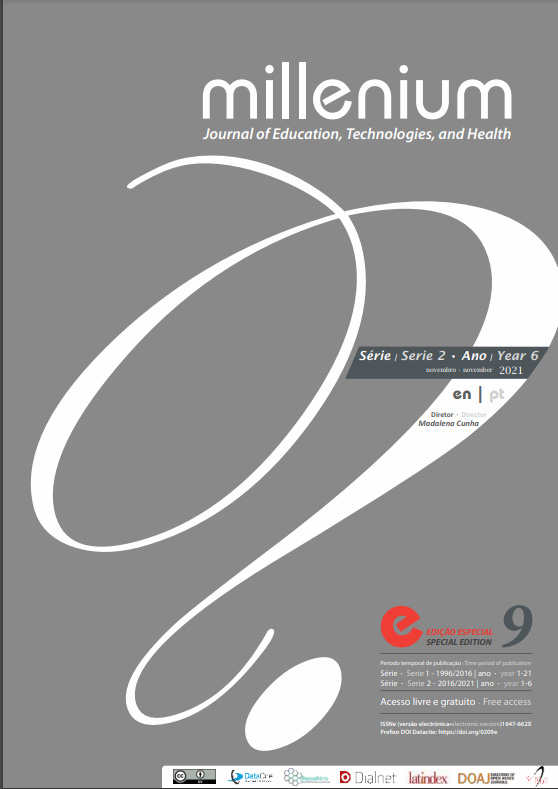Nurses' interventions in families with individuals with additive alcohol behaviors
DOI:
https://doi.org/10.29352/mill029e.24788Keywords:
alcohol-related disorders, family nurse, family healthAbstract
Introduction: Alcohol consumption is a public health issue , which damages the person's health and has an impact on family and social relationships. The family nurse plays has an essential role in the development of intervention strategies in the prevention and treatment of addictive alcohol behaviors.
Objective: To identify nurses' interventions in families with individuals with alcohol addictive behaviors.
Methods: Integrative literature review, carried out in the following databases: CINAHL Complete, MEDLINE Complete, Nursing & Allied Health Collection and PubMed, carried out in May 2021. A free secondary search was also carried out. Articles written in Portuguese, Spanish or English, complete, with free access, with no established time limit, were considered.
Results: Four articles were included, which support the interventions of the family nurse, in prevention and early intervention, to prevent or delay the onset of alcohol consumption, identify family resilience and establish a helping relationship based on effective communication, promoting the family empowerment.
Conclusion: Family nurses play a Key role in promoting, preventing and treating families, while the focus of care and family resilience is a determining factor for treatment.
Downloads
References
Fernandes, I., Andrade, L. M., Martins, M. M., Martins, T., Rolim, K. M., & Guerra-Martín, M. D. (2019). Consumo de sustancias adictivas, tabaco, alcohol y marihuana, en los estudiantes del Norte de Portugal. Enfermería Global 18(2), 180-209. https://doi.org/10.6018/eglobal.18.2.30780
Gonçalves, J. P. (2016). Ciclo vital: Início, desenvolvimento e fim da vida humana possíveis contribuições para educadores. Revista Contexto & Educação, 31(98), 79-110. http://dx.doi.org/10.21527/2179-1309.2016.98.79-110
Latham, L. (2014). Continuing education module 21: Brain disease: Alcohol misuse and the family. World of Irish Nursing, 22(5), 55-56. https://www.inmo.ie/tempDocs/Brain_disease_June_PAGE55-56june14.pdf
Lima, H. A. & Mângia, E. F. (2015). Estratégias grupais voltadas aos familiars de pessaoas com necessidades decorrentes do uso de substâncias psicoativas: uma revisão narrative. Revista de Terapia Ocupacional de São Paulo, 26 (2), 294-300. https://doi.org/10.11606/issn.2238-6149.v26i2p294-300
McCrady, B.S. & Flanagan, J.C. (2021). O papel da família na recuperação do transtorno por uso de álcool para adultos. Pesquisa de álcool: análises atuais , 41 (1), 06. https://doi.org/10.35946/arcr.v41.1.06
Paz, F.M., Colossi, P.M. (2013). Aspectos da dinâmica da família com dependência química. Estudos de Psicologia, 18 (4),551-58. http://www.scielo.br/pdf/epsic/v18n4/a02v18n4.pdf
Pereira, F., & Cunha, P. (coords.). (2017). Referencial de educação para a saúde. Lisboa: Ministério da Educação, Direção Geral da Educação, Direção-Geral da Saúde. https://www.dge.mec.pt/sites/default/files/Esaude/referencial_educacao_saude_vf_junho2017.pdf
Portugal, Ministério da Saúde, Serviço de Intervenção nos Comportamentos Aditivos e nas Dependências. (2020). Relatório anual 2019: A situação do país em matéria de drogas e toxicodependências. Lisboa: SICAD, Direção de Serviços de Monitorização e Informação / Divisão de Estatística e Investigação. http://www.sicad.min-saude.pt/BK/Publicacoes/Lists/SICAD_PUBLICACOES/Attachments/169/Relatorio_Anual_2019_A_SituacaoDoPaisEmMateriaDeDrogas_e_Toxicodependencias.pdf
Querido, A., Tomás, C., Laranjeira, C., Carvalho, D., Gomes, J., & Valentim, O. (orgs.) (2019). Evidências em saúde mental: Da conceção à ação, comportamentos aditivos. Escola Superior de Saúde de Leiria, Departamento de Ciências de Enfermagem, Enfermagem de Saúde Mental e Psiquiátrica do Instituto Politécnico de Leiria. Doi: https://doi.org/10.25766/yx3k-wj15.
Reinaldo, A. M. S., & Pillon, S. C. (2008). Alcohol effects on family relations: A case study. Revista Latino-Americana de Enfermagem, 16(spec), 529-534. https://doi.org/10.1590/s0104-11692008000700005
Usher, K., Jackson, D., & O´Brien, L. (2005). Adolescent drug abuse: Helping families survive. International Journal of Mental Health Nursing, 14(3), 209-214. https://doi.org/10.1111/j.1440-0979.2005.00383.x
World Health Organization. (2010). Global strategy to reduce the harmful use of alcohol. Geneva: WH. https://www.who.int/publications/i/item/9789241599931
Zerbetto, S. R., Galera, S. A. F., & Ruiz, B. O. (2017). Family resilience and chemical dependency: Perception of mental health professionals. Revista Brasileira de Enfermagem, 70(6), 1184-1190. http://dx.doi.org/10.1590/0034-7167-2016-0476
Downloads
Published
How to Cite
Issue
Section
License

This work is licensed under a Creative Commons Attribution 4.0 International License.
Authors who submit proposals for this journal agree to the following terms:
a) Articles are published under the Licença Creative Commons (CC BY 4.0), in full open-access, without any cost or fees of any kind to the author or the reader;
b) The authors retain copyright and grant the journal right of first publication, allowing the free sharing of work, provided it is correctly attributed the authorship and initial publication in this journal;
c) The authors are permitted to take on additional contracts separately for non-exclusive distribution of the version of the work published in this journal (eg, post it to an institutional repository or as a book), with an acknowledgment of its initial publication in this journal;
d) Authors are permitted and encouraged to publish and distribute their work online (eg, in institutional repositories or on their website) as it can lead to productive exchanges, as well as increase the impact and citation of published work
Documents required for submission
Article template (Editable format)





